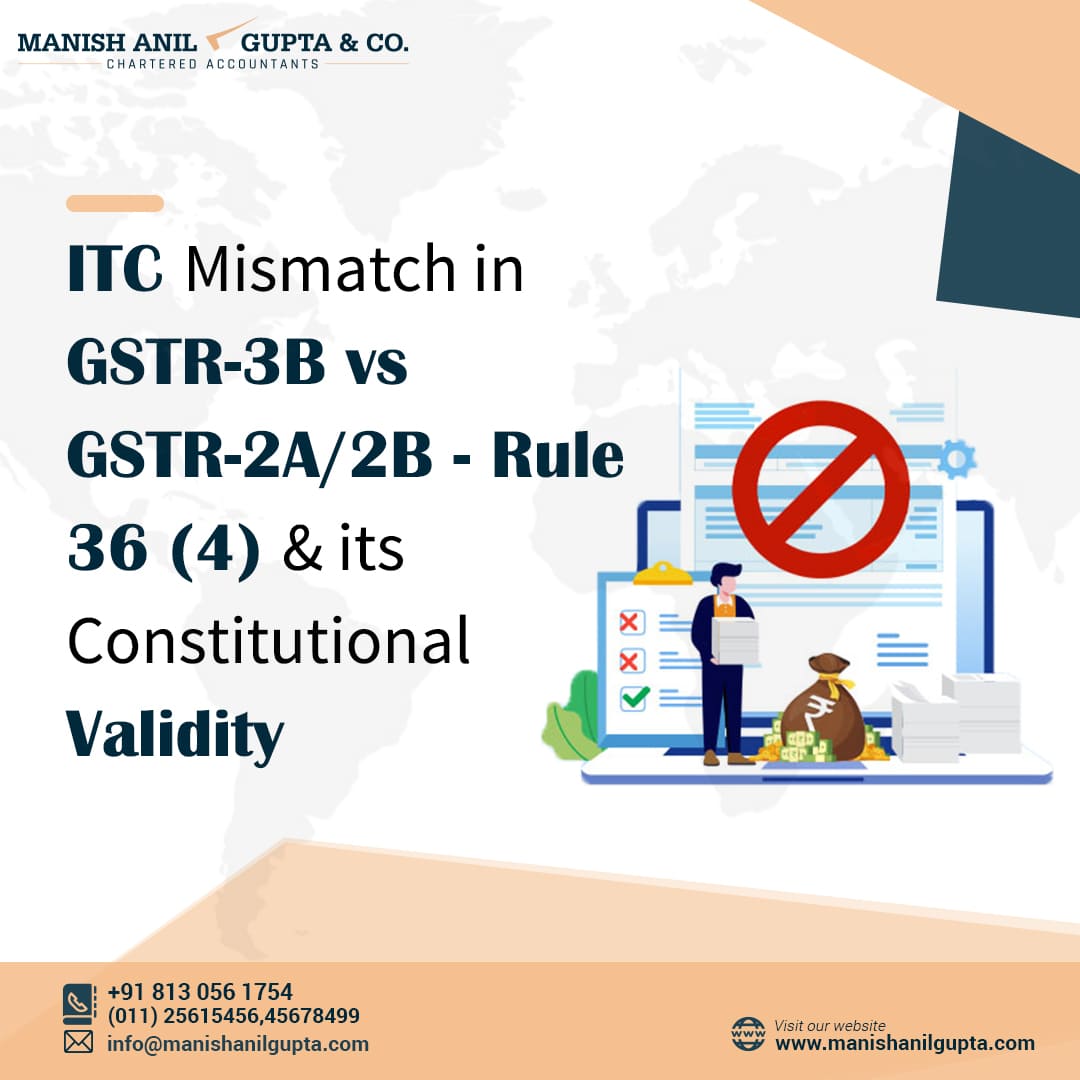
The Ultimate Guide to Transfer Pricing Methods for Business Success
Unlock the secrets of transfer pricing and navigate global taxation with confidence. . . .Jun 27, 2023
Read More
Contact us
Goods & Services Tax is a very comprehensive indirect tax levied on the supply of goods and services in our country. It was launched countrywide on July 1, 2017, by the President of India. GST was brought in as a revolutionary change and India's biggest tax system overhaul with one of the essential objectives of providing seamless credit flow to the taxpayers.
From the past year, notices of discrepancy of ITC in GST ASMT-10 have been issued by the GST department of almost all the States. The said notice sought explanation from the taxpayers for the difference between ITC claimed in GSTR-3B and ITC available in GSTR2A. Thus, an important issue comes into the brains of taxpayers, and professionals, whether input tax credit can be denied merely on the ground of mismatch between ITC availed in GSTR-3B with that reflected in GSTR-2A/2B.
The mechanism provided under Section 42 r/w rule 69 for matching of ITC is not in effect yet. Section 43A provides for the procedure of availing ITC in a manner prescribed (manner to be provided by rules itself). Rule 36(4) was inserted with effect from. 09.10.2019. Therefore, effectively no matching of ITC was required up to 08.10.2019.
To better understand the issue, we need to refer to the rule 36(4) provisions directly linked to the denial of tax credits.
Now, let us move to our essential point of consideration, i.e. rule 36(4). Clause 4 of the rule was not initially present but was added vide Notification No. 49/2019-Central Tax dated 09.10.2019. It said,
"(4) Input tax credit to be availed by a registered person in respect of invoices or debit notes, the details of which have not been uploaded by the suppliers under sub-section (1) of section 37, shall not exceed 20 per cent of the eligible credit available in respect of invoices or debt notes the details of which have been uploaded by the suppliers under sub-section (1) of section 37."
According to this, any taxpayer of the country who has filled the GSTR-3B report can claim Input Tax Credit up to 20% of the eligible input tax credit available in the GSTR-2A report.
Rule 36 (4) was first amended vide Notification No. 75/2019-Central Tax dated 26.12.2019, and the Eligible input tax credit extent was reduced from 20% to 10%. Later on, the second amendment was made vide Notification No. 94/2020-Central Tax dated 22.12.2020, further to reduce the extent from 10% to 5%.
In a nutshell, to claim ITC, Rule 36 (4) imposes a restriction that terms out very harsh from the Government. Before this, all the taxpayers used to declare a summary of eligible tax credits under IGST, CGST and SGST. The taxpayers could make an entire ITC claim in GSTR-3B based on invoices in their possession, even if the GSTR-2A reflects less than the books of accounts.
"Furnishing of outward details in FORM GSTR-1 by the corresponding supplier(s) and the facility to view the same in FORM GSTR-2A by the recipient is in the nature of taxpayer facilitation and does not impact the ability of the taxpayer to avail ITC on self-assessment basis".
But after the introduction of this rule, the ITC amount is restricted with the proper calculation of accounts and bills as all the invoices are now first uploaded regularly by the suppliers. However, there are concerns as to the constitutional validity of the rule right from its existence. Taxpayers have filed various petitions to challenge rule 36(4) on the grounds that the said condition is imposed through rules only and is not provided under the CGST/SGST Act. It is also important to note that section 43A provides only the procedure of availing credit in a manner prescribed. It does not give power to the Government for providing any such restrictions on the availment of ITC through rules.
It is also pertinent to refer to the new conditions inserted under section 16(2) of the Finance Act 2021. Section 16(2) of the CGST Act specifically talks about the conditions to avail the ITC. The new condition reads as under:
(aa) the details of the invoice or debit note referred to in clause (a) has been furnished by the supplier in the statement of outward supplies, and such details have been communicated to the recipient of such invoice or debit note in the manner specified under section 37.
However, the condition, i.e. Section 16(2)(aa), is yet to come into effect.
The officers cannot deny the credit of ITC at least up to 08.10.2019 merely on the ground of mismatch of input tax credit between GSTR-3B and GSTR-2A.
Rule 36(4) was inserted without any authority of law. Newly inserted section 16(2)(aa) is yet to come into existence. Thus, for the period after 08.10.2019, the taxpayers can file a plea that the Government cannot deny credit merely on the ground of mismatch of credit.
However, to avoid unnecessary disputes and save the time and efforts required while dealing with the department, all should make sure the supplier regularly files the GSTR-1/ IFF and GSTR-3B.
Authored by CA Manish Gupta & CA Rahul Pareva
For any queries, kindly contact at info@manishanilgupta.com
Blogs

In today’s business environment, the world demands quality professional services that are provided in a timely and cost-effective manner. We, at Manish Anil Gupta & Co, believe in putting our client’s needs squarely in front at all times.
"Need to know more about our services or what we do? Drop us your contact details and one of our professionals will call you to answer your query!"
0 Comment